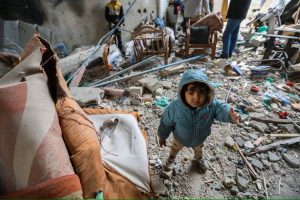The heart of Jonathan Freedland’s argument against the Stop the War Coalition in his recent Guardian article is that every case for military intervention must be taken on its own merits. It follows that it may be right to attack Iran and Syria when it was not right to attack Iraq.
Freedland argues the mistake of the anti-war movement is to think that ‘Because that’s how it was with Iraq…so it will be true of Iran, Syria or any future conflict. And so the peace movement ends up fighting the last war – specifically, the Iraq war… We need to see again what we understood well before Iraq: that every case is different.’
Ever since I read this I’ve been envious of Freedland’s state of mind.
How wonderful it would be, I’m thinking, to wake up in the morning and confront the world as if it were born anew that very day. No event from the past impinges on our knowledge of the present. History is not our guide since it may all go differently today. It’s a kind of perpetually optimistic Groundhog Day.
But, as has long been recognised, those who forget history are doomed to repeat its errors. And Freedland himself, far from treating Iran and Syria as different from Iraq, exactly repeats the pro-war arguments from the Iraq era.
Freedland suggests that the anti-war movement is not, like him, ‘appalled at the sight of the world doing nothing as children and their parents are killed and maimed by Bashar al-Assad’s troops’. Substitute ‘Saddam Hussein’ and the ‘Kurds of Iraq’ or ‘the Taliban’ and the ‘Women in Afghanistan’ and you have a precise reproduction of the moral blackmail that the neo-cons practiced in the run up to the Afghan and Iraq wars.
The heart of Jonathan Freedland’s argument against the Stop the War Coalition in his recent Guardian article is that every case for military intervention must be taken on its own merits. It follows that it may be right to attack Iran and Syria when it was not right to attack Iraq.
Freedland argues the mistake of the anti-war movement is to think that ‘Because that’s how it was with Iraq…so it will be true of Iran, Syria or any future conflict. And so the peace movement ends up fighting the last war – specifically, the Iraq war… We need to see again what we understood well before Iraq: that every case is different.’
Ever since I read this I’ve been envious of Freedland’s state of mind.
How wonderful it would be, I’m thinking, to wake up in the morning and confront the world as if it were born anew that very day. No event from the past impinges on our knowledge of the present. History is not our guide since it may all go differently today. It’s a kind of perpetually optimistic Groundhog Day.
But, as has long been recognised, those who forget history are doomed to repeat its errors. And Freedland himself, far from treating Iran and Syria as different from Iraq, exactly repeats the pro-war arguments from the Iraq era.
Freedland suggests that the anti-war movement is not, like him, ‘appalled at the sight of the world doing nothing as children and their parents are killed and maimed by Bashar al-Assad’s troops’. Substitute ‘Saddam Hussein’ and the ‘Kurds of Iraq’ or ‘the Taliban’ and the ‘Women in Afghanistan’ and you have a precise reproduction of the moral blackmail that the neo-cons practiced in the run up to the Afghan and Iraq wars.
Our case is that western intervention will make this suffering worse, not alleviate it. This is what happened in Libya where the 4,000 who had lost their lives in the conflict with Gadaffi became 30,000 after the NATO air war began, according to the Libyan National Transitional Council’s own figures. A local civil war may be a brutal and bloody affair, but only an advanced industrial military machine can inflict this level of casualties.
In Syria an air war would cause even higher casualties than in Libya. The populations of Syria and Libya are 22.5 million and 6.5 million respectively. The population densities of Syria and Libya are 110 people per square kilometre and 4 people per square kilometre respectively. The active armed forces of Syria are made up of 295,000 people with reserves of 314,000, compared to Libya’s 76,000 plus 40,000 reserves.
The other non-violent steps that Freedland advocates would be seized on by the war mongers not as an alternative to war but a preparation for war. Sanctions are now imposed, will soon be declared not to have worked, and then the other military ‘options that have not been ruled out’ will come into action.
A buffer zone, advocated by some, will accelerate the militarization of the conflict, not the end of it. The creation of such a buffer zone would mean war because it could not be established without international forces launching a pre-emptive air campaign to neutralize the Syrian government’s air-defence systems. This would mean bombing military installations in and around cities such as Damascus, Aleppo, and Lattakia – all densely populated areas. An important section of the Syrian military assets are located in close proximity to urban settings.
In the case of Iran the links with the Iraq war are even more direct.
The neo-con objective in Iraq was to establish a pro-western, pro-business base for operations in the Middle East. Before 1979 this facility had been provided to them by Israel, of course, and by the Shah’s Iran. The Iranian revolution ended this option. For a while Saudi Arabia performed this function but, in the aftermath of the First Gulf War, even the Saudi regime found being a home for permanent US bases too uncomfortable to sustain. The invasion of Iraq was, among other things, supposed to solve this problem.
The Iraq invasion and the occupation turned into such a disaster that at the end of it the Iraqi government refused to sign a Status of Forces agreement which would have allowed 50,000 US troops to remain at bases in Iraq. Of course US influence, private armies and corporations remain. But military action launched from Iraq is not possible.
This, and the wider collapse of political support for the US across the Middle East, meant that the Iraq war left Iran as a considerably stronger regional power than it was before the war. Given its links, perceived and real, with Syria, Hamas, Hezbollah and, now, with a section of the Iraqi government, Iran has become a major foreign policy crisis for the US.
This is why an attack on Iranian nuclear facilities, ensuring that Israel is the only nuclear power in the Middle East, is now part of the unintended consequences of the Iraq war for the US. It is in this sense that an attack on Iran is very much connected with the US’s long struggle to maintain imperial hegemony in the Middle East.
Freedland worries about Iran gaining a nuclear weapon. Though why he finds this more frightening than Israel (or Pakistan, for that matter) having one is not clear. But if this, and a new unstable Cold War in the Middle East, is what concerns him then here is a non-violent solution: the US should declare in favour of a non-nuclear Middle East and insist that its ally Israel enters negotiations to decommission its nuclear programme. This would make it impossible for Iran to continue its programme.
But if the only offer on the table is that Israel remains the sole nuclear power in the region and no one else can ever think of developing a nuclear programme then this is likely to be seen for what it is: an undisguised attempt to prop up US and Israeli hegemony in the Middle East.
Iranians, who may not have Freedland’s useful facility for forgetting the past, have long experience of this. They know of the attempted coup by the CIA and MI5 against their democratically elected prime minister in 1953. They have a living memory of the US opposition to their revolution in 1979, and the long years of support for the Shah which preceded it.
The present will not be a simple repeat of the past. But it will be shaped by it. And the past has made these looming conflicts more, not less, dangerous than those that went before.





